Everyone knows that dogs have very strong teeth that can easily chew their way through your favorite pair of shoes, furniture, and even family heirlooms. But their teeth are not impervious to the effects of their lifestyle. In fact, most dogs, of all species, develop one form or another of periodontal disease, which is a condition of the gums, as early as six or eight months of age, mainly due to the fact that the animals keep their baby teeth into adulthood.
"Dental disease is a serious problem in pets. Signs of dental abnormalities can begin from birth with misalignment of the jaws. Young animals commonly retain their deciduous (baby) teeth and both young and adult animals can develop periodontal (gum) disease as early as six to eight months of age," explain Dr. W. Eugene and Linda Lloyd Veterinary Medical Center community practice veterinarian, Dr. Brenda Mulherin.
"Dental cleanings are another way that pet owners can be proactive. In the long-run periodic dental cleanings can save owners the expense of costly problems in the future as well as save their pets' teeth from being extracted," she adds. Although some may argue that dogs' teeth do better without human intervention, veterinarians say that having their teeth brushed daily with special paste can help dogs rid painful gum afflictions.
Mulherin commonly has to perform teeth cleanings and other such interventions on animals which have a very poor condition in regard to their teeth, mouth and jaw. She says that most of these problems could have been avoided if people had simply cleaned their dogs' teeth every night.
Special food, designed to act like a toothpaste, is also a solution to this problem, and a very effective one, considering the fact that a lot of pet owners can find the whole experience of brushing a dog's teeth very daunting.

 14 DAY TRIAL //
14 DAY TRIAL //